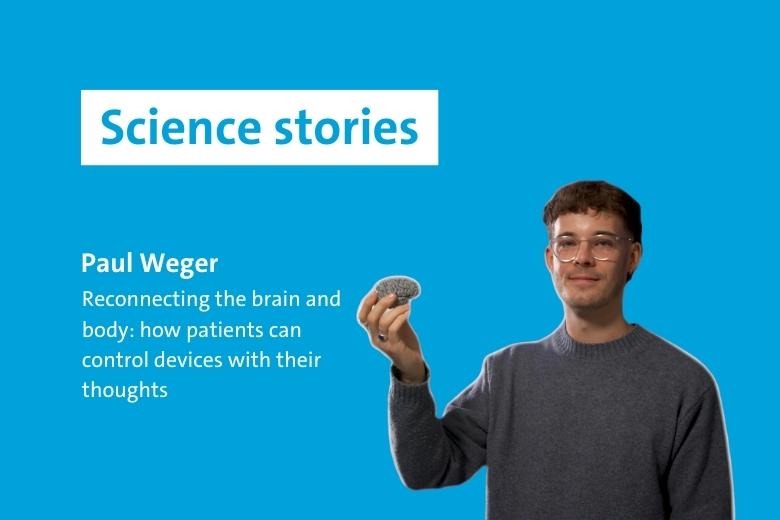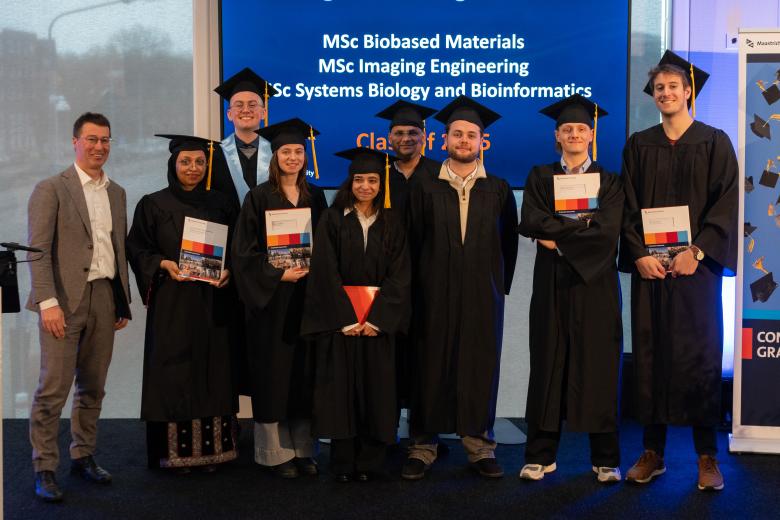A new outlook on rehabilitation care
Instead of only looking at a patient’s symptoms, Ivan Huijnen advocates helping patients get back to their life as soon as possible. This way, he aims to shift from the biomedical ‘disorder-focused thinking’ to an integral view on healthcare. Ivan is a senior researcher at the Department of Rehabilitation Medicine at the Care and Public Health Research Institute (CAPHRI) and manager of the Adelante knowledge centre. He is special lector at Zuyd University of Applied Sciences and delivered his inaugural lecture last April, titled 'Appropriate rehabilitation care: Across borders’.
Since his childhood, Ivan had been interested in movement: first as an active athlete, and after an accident also as a patient. “I went into rehabilitation, which I found fascinating,” he says. “It sparked my enthusiasm to pursue rehabilitation, which is why I chose my studies in health sciences and physical therapy. During my PhD, I focused more on rehabilitation for people with chronic pain, to explore how they can function as well as possible despite having pain that cannot always be resolved. I found it interesting not only to look at what is happening biomedically but also psychosocially, for instance how someone copes with their pain and what their environment is like. Through this, you can effectively guide a patient in this, and ultimately help them to regain the control over their life.”
Vacancies
Working together with colleagues and patients is something Ivan enjoys, but also finds important. “In the South Limburg region, there are issues that require innovative solutions,” he says. “The population ages fast, and there are many people with chronic conditions. This number is only expected to increase. However, there is also a growing shortage of staff, which makes it harder to provide care to this expanding group. It is very challenging to retain healthcare vacancies. This is especially an issue with psychologists and nurses now, but I expect it to be much broader in a few years. It is quite a task, and we, as a region, need to tackle it together. At the moment, people mainly work within their own line of care or organisation, but it is important to further improve cooperation across and beyond these. However, doing so is not easy. There is pressure on day-to-day care, and change takes time, even though everyone acknowledges its importance.”
Network
Ivan's lectorate focuses on the paramedical disciplines in rehabilitation care and is called ‘Appropriate rehabilitation care’. “This means we investigate how to provide the right rehabilitation care in the right place,” he explains. “We examine where patients can receive the best possible care, whether the healthcare professional can deliver that care in that place, and whether the care aligns with the patient's needs and symptoms. We have already conducted research on this for patients with chronic pain and post covid symptoms. In these studies, GPs, physiotherapists, and medical specialists in rehabilitation care worked closely together to organise the healthcare chain around the patient as effectively as possible. The aim was to offer care at home or as close to home as possible, unless specialised care in a centre or hospital was necessary. To further improve these collaborations, we now also organise training sessions and peer review meetings, supporting healthcare professionals in delivering high-quality care."
Instead of the traditional biomedical 'disorder-focused' thinking, we use the integral view to look at how we can support the patient in returning to the activities he values as soon as possible.
Integral view
Ivan is also one of the driving forces behind the Living Lab Rehabilitation (LLR). This is a collaboration between Maastricht UMC+, Zuyd Hogeschool, and Adelante, which focuses on strengthening the position of rehabilitation within healthcare. The LLR developed two policy plans: one for research and innovation, and one for education. “Within education, we want to emphasise the integral view, with the patient at the centre,” he explains. “Students are currently trained within the scope of their own discipline, but often lack sufficient understanding of what professionals in other fields do. They aim to get the most out of their own expertise for the benefit of their patient, but sometimes someone from another discipline could offer something even more helpful. By combining insights, you enrich each other’s work and can better achieve the patient’s goals together. Collaboration in healthcare is not easy, much of the system is still organised in silos. I would like to take further steps towards better integration of interprofessional collaboration within education. Through the LLR and the lectorate, we can help translate developments in rehabilitation care into education.”
He gives an example of this integral view: “A patient with persistent knee pain visits their GP, who refers him to a physiotherapist. Despite weeks of sessions, the pain does not go away. He returns to the GP, who refers him to an orthopaedic specialist. Scans and examinations do not yield a clear cause, and a second opinion does not bring any improvement either. The patient does not know what to do next and ends up back at the GP. This way, the patient moves through the entire healthcare system without a clear solution being found. Meanwhile, he struggles with participation in daily life. For instance, he no longer goes for walks or plays sports, or can only work to a limited extent. Instead of the traditional biomedical 'disorder-focused' thinking, we use the integral view to not only look at the issue in the knee, but also at how we can support the patient in returning to the activities he values as soon as possible. However, current healthcare systems are not yet fully set up for this way of working. Time and funding play a significant role in that.”
Ultimately, you will not do this as an individual but with a whole group and all kinds of stakeholders.
Pyramid
A few years ago, the World Health Organization (WHO) launched the World Rehabilitation Alliance (WRA), an initiative aimed at making rehabilitation more accessible to all patients. “Maastricht University is the only party in the Netherlands that is part of this alliance,” Ivan says. “The Ministry of Health, Welfare and Sports is also involved. Our Department of Rehabilitation Medicine started working on this within our regio. Last year, we held a meeting with all healthcare professionals involved in rehabilitation care to collectively assess rehabilitation care. Based on that, we published a position paper outlining our vision for this care in South Limburg by 2030. With this, we aim to take concrete steps towards engaging insurers and healthcare administrators, in order to make appropriate rehabilitation care a reality.”
AI
Ivan has more plans for the future. “We are trying to create an innovation and change climate, for example by letting students work with staff members ,” he says. “This way, students gain experience in rehabilitation, and they can work on questions from staff that are now often left unanswered. We are also looking at how we can use e-health and technology like AI and give them a proper place in the future of healthcare. This offers enormous opportunities to continue delivering high-quality care.”
Success
When does Ivan consider his work successful? “It is a process, which makes it difficult,” he says. “Ultimately, you will not do this as an individual but with a whole group and all kinds of stakeholders. When opportunities arise for this new way of collaborating, and people become enthusiastic about making that change, I think we have made great strides. However, this development will take time. We really need to figure out how to reorganise care: closer to home, as low as possible in the chain, and supporting the patient as quickly as possible so they regain control of their life. We will need to move in that direction, because how else are we going to meet the rising demand for healthcare?”
Text and photo: Joëlle van Wissen
Interview: Toñita Perea y Monsuwé
Also read
-
Reconnecting the brain and body: how to control devices with your thoughts
Can you control a robotic arm with your thoughts? Paul Weger (MHeNs) studies this to give back independence to patients with neurological conditions.
-
Green school playgrounds boost concentration and wellbeing
Children at schools with green playgrounds are better able to concentrate and display more social behaviour. This is the conclusion of a follow-up study within the long-running project The Healthy Primary School of the Future .
-
Ron Heeren appointed fellow of the Netherlands Academy of Engineering
Professor Ron Heeren, distinguished university professor at Maastricht University (UM) and director of the Maastricht MultiModal Molecular Imaging Institute (M4i), was appointed as a fellow of the Netherlands Academy of Engineering (NAE) on Thursday 11 December.